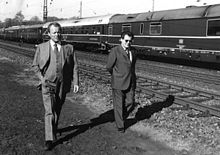Günter Guillaume
He was the only child of Karl Ernst Guillaume, a pianist who played in bars and theatres, where he provided background music for silent films, and Johanna Old Pauline (née Loebe), a hairdresser.These experiences made the extremist policies being presented by Adolf Hitler and Nazi Party attractive to Karl Guillaume, and he joined in March 1934.In East Germany, Guillaume was received and celebrated as a hero, worked as a spy trainer, and published his autobiography Die Aussage ("The Statement")[4] in 1988.Guillaume and East German spymaster Markus Wolf said that Willy Brandt's downfall was not intended, and that the affair was among the Stasi's biggest mistakes.[5] In his testimony, he claimed he "could barely remember details of events stretching back over forty years" and in response to most questions put by the prosecution and the presiding judge, Guillaume only referred them to his autobiography.
BerlinWeimar RepublicPetershagen-EggersdorfEast GermanyIntelligenceWilly BrandtTreasonChristel GuillaumeGreater German ReichGerman Democratic RepublicLuftwaffeOberstWorld War IIOrder of Karl MarxWest GermanyGuillaume affairPrenzlauer Bergworking-classhairdressersound filmsAdolf HitlerNazi PartyFlakhelferChristelemigratedhierarchySocial Democratic Party of GermanyEastern BlocMarkus WolfDie WendeGerman reunificationimmunityDemocracyMichael FraynDer SpiegelThe New York TimesThe Independent